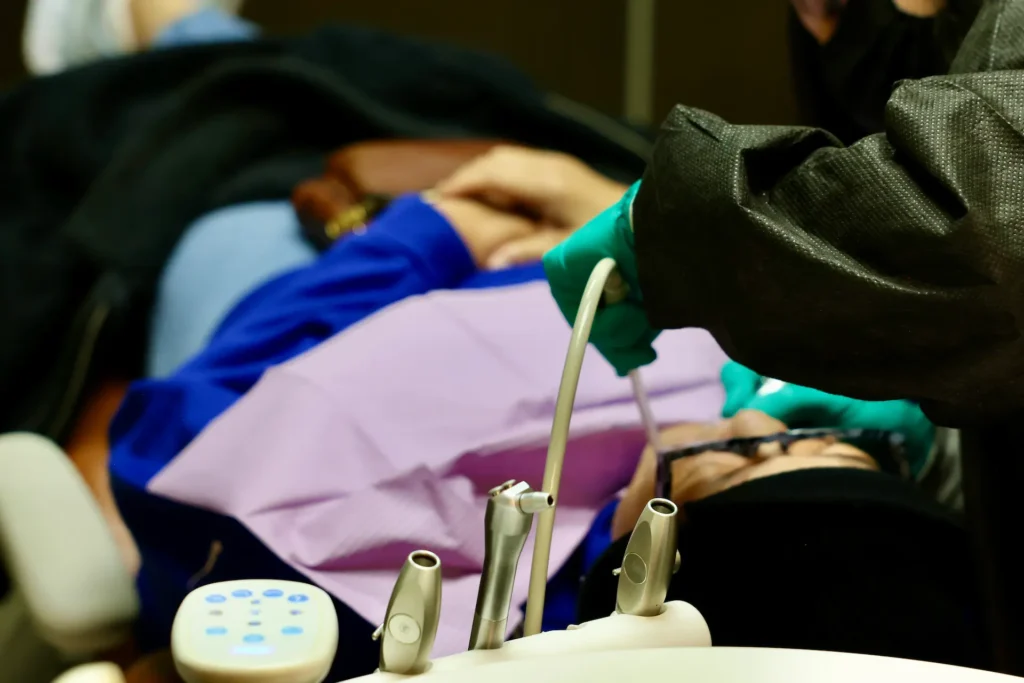Bleeding gums are a common problem. This condition can happen for various reasons, like using too much force when brushing your teeth or having dentures that don’t fit properly. These instances seem minor but can also be early signs of more significant issues.
If you notice bleeding, it could indicate issues like gum disease. Gum disease starts with plaque buildup on your teeth, a sticky film of bacteria that can cause gums to become inflamed and lead to bleeding.
Maintaining good oral hygiene practices, visiting your dentist regularly, and making lifestyle changes can help stop bleeding gums and keep your mouth healthy.
Causes of Bleeding Gums
Bleeding gums can be caused by several factors, which are important to recognize so you can take the right steps to treat them.
Gingivitis and Periodontal Disease
Gingivitis is the first stage of gum disease. It occurs when plaque, a sticky film of bacteria, builds up on teeth and causes the gums to become inflamed. If plaque is not removed by daily brushing and flossing, it can turn into tartar, leading to more inflammation and bleeding.
This can progress to periodontitis, a more severe form of gum disease where the gums pull away from the teeth and form pockets that can become infected.
Pregnancy Gingivitis
During pregnancy, hormonal changes can make your gums more vulnerable to plaque, leading to gingivitis and bleeding gums. This is why dental care is especially important during pregnancy.
Brushing Too Hard or Rough
Brushing your teeth too hard with a hard-bristled toothbrush can cause your gums to bleed. This is why dentists recommend using a soft-bristled brush and gentle motions when brushing your teeth.
Starting a New Flossing Routine
If you’re not used to flossing, starting a new routine can cause bleeding. However, this should improve as your gums become healthier with regular flossing.
Use of Certain Medications like Heparin, Apixaban, Warfarin, etc
Some medications, especially those that thin your blood, can make bleeding gums more likely. It’s important to tell your dentist about any medications you’re taking.
Ill-fitting dentures or Dental Restorations
Dentures or dental restorations that don’t fit correctly can irritate your gums, leading to bleeding. On the other hand, properly fitted dental implants can avoid this problem and provide a stable replacement for missing teeth.
Other Health Conditions
Bleeding gums can also signal other health issues, such as diabetes, leukemia, thrombocytopenia (a low platelet count), hemophilia, von Willebrand disease, and vitamin deficiencies (such as vitamin C or K deficiency). These conditions affect your body’s ability to clot blood or fight infections, which can lead to gum bleeding.
Recognizing these causes is the first step toward treating bleeding gums. If you notice persistent bleeding, it’s important to consult a dentist or healthcare provider to determine the underlying cause and receive appropriate treatment.
Risk Factors for Bleeding Gums
Understanding the risk factors for bleeding gums can help you prevent them and maintain healthy gums.
Smoking and Tobacco Use
Smoking and the use of tobacco products can greatly increase your risk of gum disease. Tobacco use can harm gum tissue, making it more vulnerable to infection.
Hormonal Changes
Changes in hormone levels during puberty, menstruation, pregnancy, and menopause can make gums more sensitive and prone to bleeding. During these times, taking extra care of your oral hygiene can help reduce the risk of bleeding gums.
It’s important to be aware of these risk factors and take steps to mitigate them. If you have concerns about bleeding gums or other oral health issues, it’s always best to consult a dentist.
Symptoms of Bleeding Gums
Bleeding gums can be a sign that there is a problem with your oral health. It’s important to know what symptoms to look for so you can take action.
What to Look For
If your gums bleed when you brush or floss, it’s a clear sign that something is wrong. Healthy gums should not bleed from regular cleaning. You might also notice that your gums are red, swollen, or tender. These symptoms could point to gum disease or other dental issues.
How to Tell if You Have Gingivitis or Periodontal Disease
Gingivitis is the early stage of gum disease, characterized by red, swollen gums that may bleed when you brush or floss. If gingivitis is not treated, it can advance to periodontal disease, a more serious condition in which the infection goes deeper. This can lead to gums pulling away from the teeth, forming pockets that can get infected, and eventually, tooth loss.
Diagnosis: When to See a Dentist or Doctor
If your gums bleed, it’s a sign you should see a dentist or doctor. Bleeding gums can indicate gum disease or other health issues that require professional attention.

When to Make an Appointment
- Visit your dentist every 6 months for a check-up and cleaning, even if your gums don’t bleed.
- If your gums bleed when you brush or floss, make an appointment. It could be an early sign of gum disease.
- If your gums bleed often or easily without brushing or flossing, seeing a dentist is important.
- If you have symptoms like red, swollen, or tender gums, bad breath that won’t go away, or loose teeth, you should see a dentist.
What to Expect at Your Appointment
Your dentist will ask about your symptoms and examine your mouth, teeth, and gums. They might measure the pockets in your gums, take X-rays, or perform other tests to see if there is any bone loss or deeper infection.
Why It’s Important
Seeing a dentist or doctor when you notice these signs is crucial because treating gum disease early can prevent more serious health problems. Gum disease is linked to other health issues like heart disease, diabetes, and stroke. Early treatment can reverse the damage and keep your gums healthy.
Treatment for Bleeding Gums
Treating bleeding gums is important to prevent further oral health issues. Here are some common treatments that can help:
Scaling and Root Planing
This is a deep cleaning procedure done by your dentist. It removes plaque and tartar below the gum line, where regular brushing and flossing can’t reach. This helps heal gum tissue and stop bleeding.
Antibiotics
If an infection is causing your gums to bleed, your dentist may prescribe antibiotics. These can be a mouth rinse, a gel applied directly to the gum pocket, or oral tablets or capsules.
Surgery
In severe cases of gum disease, surgery might be necessary. Procedures can include flap surgery to remove tartar deposits in deep pockets or bone and tissue grafts to regenerate lost bone and tissue.
In some cases, dental implants could be a comprehensive solution in cases where problem teeth need to be extracted. In these cases, dental implants can prevent further damage (and the associated pain) and be a long-term solution for dental problems.
Lifestyle Changes
Making changes to your lifestyle can also improve the health of your gums. Quitting smoking, improving your diet to include more vitamins C and K, and managing stress can help reduce gum bleeding.
Tips for Preventing Bleeding Gums
- Brush your teeth twice using fluoride toothpaste with a soft-bristled toothbrush.
- Floss daily to remove plaque.
- Use an antibacterial mouthwash.
- Visit your dentist regularly for check-ups and cleanings.

Take Charge of Your Gum Health Today!
Taking care of your gums is a vital part of maintaining overall health. If you notice bleeding gums, don’t wait to seek help. Early treatment can prevent the condition from getting worse and protect your teeth and gums.
Schedule a consultation with us today to address the cause of your bleeding gum. Taking action now can save you from more serious problems in the future and keep your smile healthy and bright.
Frequently Asked Questions
Why Are My Gums Bleeding?
Your gums might be bleeding for several reasons, including brushing too hard, gum disease (such as gingivitis or periodontitis), using the wrong toothbrush, or starting a new flossing routine. Other causes can be related to health conditions like diabetes, vitamin deficiencies, or hormonal changes.
How to Stop Bleeding Gums
To stop your gums from bleeding:
- Improve your oral hygiene routine by gently brushing with a soft-bristled toothbrush.
- Use an antibacterial mouthwash to reduce plaque buildup.
- If bleeding persists, visit your dentist for professional advice and treatment.
What Deficiency Causes Bleeding Gums
Vitamin deficiencies, particularly in vitamins C and K, can cause your gums to bleed. Vitamin C is crucial for gum health and healing, while vitamin K is necessary for blood clotting.
How to Avoid Bleeding Gums
Avoid bleeding gums by maintaining good oral hygiene practices, including regular brushing with a soft-bristled brush, flossing, and using mouthwash. Also, eat a balanced diet rich in vitamins and minerals, avoid smoking, and visit your dentist regularly for check-ups and cleanings.
How to Stop Gum Bleeding Immediately
If your gums start bleeding suddenly, rinse your mouth with a mild saltwater solution to clean the area and reduce bacteria. Apply gentle pressure to the gums with a clean, damp cloth or gauze. If bleeding does not stop or is a recurring issue, consult your dentist for further evaluation and treatment.



